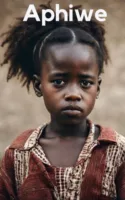“Why can’t I go live with Mama?”
Aphiwe has been asking this question since her grandmother placed her suitcase on the bed, opened it, and started taking her pieces of clothing out of the wardrobe, one by one.
Her grandmother has given her the same answer every time: “It’s better for you to live with your father.”
It has been only a week since her mother’s wedding, and Aphiwe has not seen or spoken to her since the morning she left home in a white dress.
Until now, for the whole 13 years of Aphiwe’s life, it had been just the three of them: her, her mother and her grandmother. They were like three best friends who fought about Gogo turning the radio volume too high, Aphiwe forgetting to wash the dishes, and her mother always wanting to watch tacky reality shows on TV. Other than that, they loved each other and laughed together all the time. For all her life, Aphiwe had known only one home: the three-bedroom house in Hammersdale township.
Aphiwe’s mother went to work at the supermarket every morning, and Aphiwe went to school. Gogo stayed at home and worked on her vegetable garden until someone shouted her name at the gate and they ended up gossiping about the whole neighbourhood.
They had a good life, a simple and happy one, because they loved each other dearly.
Aphiwe’s mother once told her that when Gogo found out Aphiwe’s mother was pregnant, she was so angry that she kicked her out of their home. Aphiwe’s mother was only 15-years-old and in Grade 10 when she had Aphiwe.
Her aunt was kind enough to take her in until Gogo’s heart softened and she came to fetch her back home.
“And my father?” Aphiwe asked her mother once.
“Your father was in matric. He passed and went to university far away in Cape Town.”
Aphiwe had never met her father in her life.
“Did his family kick him out too?”
“No, he was not the one pregnant. Now hurry up, put your lunchbox in your backpack.”
“Is he dead?”
“Put your lunchbox in your bag, Aphiwe, Malume will be here now now.”
That was the end of that conversation.
Malume didn’t have patience at all, he had to find you waiting outside your gate or he’d leave you. That was always the threat but he had never left anyone, not even Lubanzi who lived five houses away and had nobody to help her get ready for school because her mother was always out drinking all night and sleeping all day. Malume had 22 other children to drive to school, different schools. Nobody was concerned about the fact that he squashed all 23 of the children into the back of his van.
Three years before, when she was 10, Aphiwe was out stealing mangoes from people’s trees like she did every Saturday with her friends. She had only picked three when the older boy from next door found the children and shouted her name.
“Aphiwe, your Gogo wants you to come home, now.”
She didn’t want to go home, she had been able to pick only three mangoes, her friends had far more and she knew they weren’t going to share with her. That was the rule.
“Aphiwe!!! Now!” the boy demanded.
She was sulking all the way home, wondering what was so important that her grandmother would spoil her Saturday like that. It was even stranger because normally her grandmother didn’t want Aphiwe sitting in the house all day, eating non-stop and making noise with those cartoons she watched.
Aphiwe noticed as she approached her house that there was a car parked at the gate. A big car that looked like it got washed and polished every day. They had never been visited by someone with a car before.
Tell us: What do you think of the story so far? What do you think of the characters?


